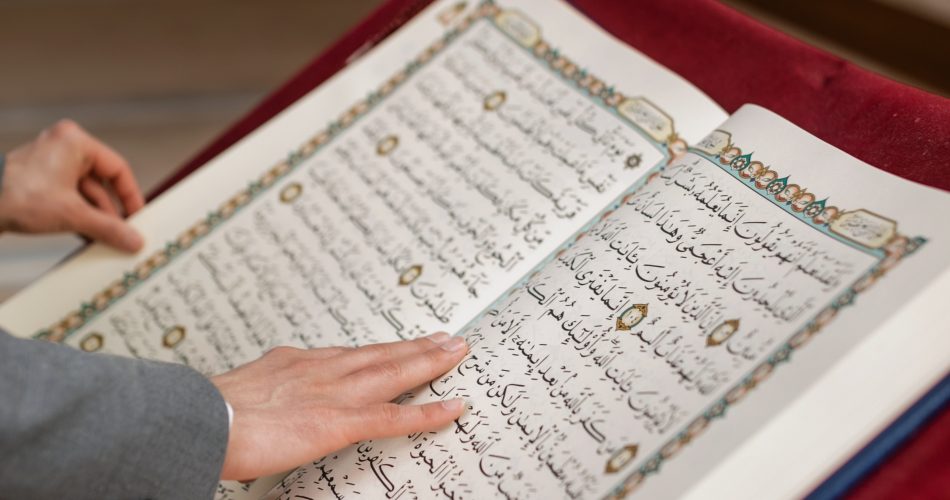It is well-known that the Qur’an is the Silent Qur’an and the Infallible Imams are the Talking Qur’ans. A famous hadith states that Imam Ali (AS) is with the Qur’an and the Qur’an is with Imam Ali (AS) (al-Mustadrak). Another famous tradition is Hadith Thaqalayn, when the Holy Prophet (SA) said he is leaving two weighty things, the Qur’an and the Ahlul Bayt (AS) (Sahih Muslim). We can clearly see then the relationship between the Imams and the Qur’an. Furthermore, we all know that the Qur’an was revealed to the heart of the Holy Prophet (SA).
So… what about me and my relationship with the Qur’an? Does my relationship with the Qur’an also tell me something about the status of my relationship with the Imams (AS) and the Prophet (SA)? And then what about my relationship with the One who revealed it to us, the One whose Word it is? Yes, indeed. The better that our relationship is with the Qur’an, then there is no doubt that we will have a better relationship and closeness with Allah, the Prophet (SA), and the Imams (AS).
When we want to speak to Allah, we raise our hands and make du’a, but when we want Allah to speak to us we should read the Qur’an. You probably know of many stories where people open the Qur’an up when they want Allah to answer a question they have. The difference between the Qur’an and other miracles is that it is a Living Miracle. It is not just a Book sent by Allah, but His Word and His Speech. So, every verse is as if Allah is speaking to us. Hence, if we ask Him He will answer us.
Now that we understand the importance of having a loving and sincere relationship with the Qur’an, let’s talk about a few ways in which we can strengthen this relationship. It is recommended to have a good routine and a good timetable in which we read Qur’an every day. Most scholars would recommend reading it before or after Salat al-Fajr. Another good time is just before bed. The important thing is for you to choose a time which would be good for you and that you could commit to.
The next thing would be to try and make some time to read the translation. You could start with once a week for a few minutes and then slowly build it up. Afterwards, you could progress to looking at the tafsir (commentary of the Qur’an). Alhamdulillah, now you live in an age where many reliable and excellent books are easily accessible online. Try to start with reading the translations and commentaries of the shorter surahs and then surahs you are familiar with. As always, it is good to involve family members and always ask what you do not understand so you can keep increasing that beautiful thing called knowledge.
I wanted to share some beautiful and inspirational hadith about the Qur’an which can really motivate us to develop our own relationship with the Word of God. Imam Zayn al-‘Abidin (AS) says, “If all the people between the East and the West die, I will not fear because the Qur’an is with me (al-Kafi).” This is a tradition to really ponder, especially during lockdown. Can anyone who has the Word of God in their reach ever feel truly lonely or fearful? You don’t feel alone when your friends and family are with you. That is the relationship that we should have with this Holy Book, like a friend we are overjoyed and excited to meet and converse with every day. Imam Khomeini used to read Qur’an before every prayer (Tranquil Heart, trans by M Raza). There are always times when we wonder what to do. Why not even randomly open a page and see what God wants to tell you at that moment?
Another important hadith, especially for the young readers, states that if a youth among believers recites the Holy Qur’an it gets mixed in his flesh and blood (Imam al-Sadiq (AS), Sawabul ‘Amaal). What does this tradition mean? It means that when you perform an action, you do it with your body, which is your flesh and blood. The important thing is that since you learned the Qur’an and developed that relationship with the Qur’an when you were young, you know the teachings of the Qur’an. So, when you do things you do them according to the Qur’an. In essence then the Qur’an has become mixed with your flesh and blood! This is how we can understand why the Imams are called the Speaking or Living Qur’ans. They are a manifestation of the teachings of the Qur’an. To an extent we can also achieve that, at any age, but it is easier if we start when we are young.
We pray that Allah (SWT) gives us the tawfiq (guidance) to build our connection with His Holy Book and that it in turn leads to a better understanding of our Imam (AF), may Allah (SWT) hasten his reappearance.


